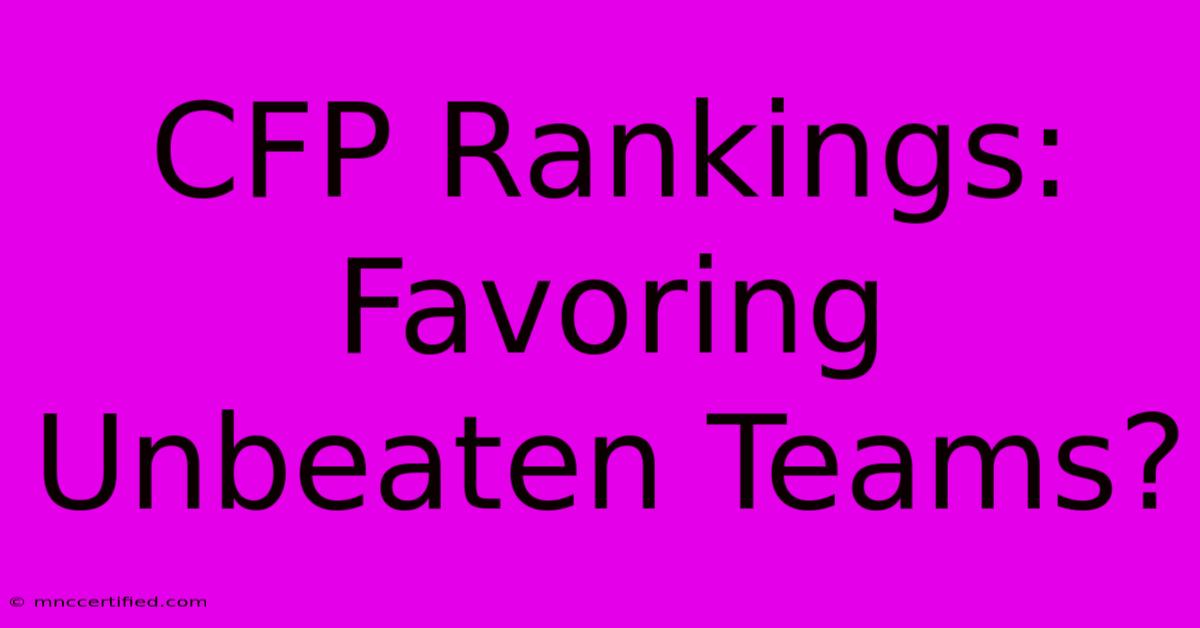CFP Rankings: Favoring Unbeaten Teams?

Table of Contents
CFP Rankings: Favoring Unbeaten Teams? A Deep Dive into Selection Bias
The College Football Playoff (CFP) rankings are a source of constant debate and speculation. While the selection committee insists on a holistic approach, many believe an unbeaten record carries undue weight. This article delves into whether the CFP rankings indeed favor undefeated teams, exploring the complexities of the selection process and analyzing potential biases.
The Undefeated Advantage: Myth or Reality?
The undeniable truth is that undefeated teams frequently occupy the top spots in the CFP rankings. This isn't necessarily a sign of bias, but rather a reflection of the inherent difficulty in remaining undefeated throughout a grueling college football season. An unbeaten record often signifies consistent high-level performance across multiple games, against varying opponents. This consistent success naturally elevates a team's profile and strengthens its claim for a playoff spot.
However, the question remains: does an undefeated record guarantee a spot, even if a one-loss team boasts a superior resume in other aspects, like strength of schedule or quality wins? This is where the controversy arises.
Analyzing the Selection Criteria: Beyond Wins and Losses
The CFP selection committee considers a multitude of factors, including:
- Wins and losses: While undeniably significant, this is just one piece of the puzzle.
- Strength of schedule: A team that has consistently played and defeated strong opponents receives a significant boost. Playing a weak schedule, even with an undefeated record, can significantly hurt a team's ranking. This is a crucial differentiator between truly elite teams and those who have only played weaker competition.
- Head-to-head results: If two teams have played each other, the outcome of that game carries substantial weight.
- Comparative outcomes of common opponents: This helps contextualize victories and losses against shared opponents, providing a more nuanced comparison.
- Dominance: The margin of victory and overall performance in each game are considered. A team consistently dominating opponents is viewed more favorably than a team that squeaks by with close wins.
Case Studies: Examining Controversial Rankings
Several past CFP seasons have sparked debates about the relative importance of an undefeated record versus other metrics. Examining these instances sheds light on the nuances of the selection process and helps us understand the potential for bias.
For example, [Insert example of a year where a one-loss team was ranked lower than an undefeated team despite arguably having a stronger resume]. This sparked significant discussion regarding the weight given to an undefeated record versus other selection criteria. Similarly, [Insert another example]. These cases highlight the complexity of the selection process and the ongoing debate surrounding its fairness.
The Importance of Context and Nuance
It’s crucial to avoid oversimplifying the CFP rankings. While an unbeaten record is undoubtedly a significant factor, it's rarely the sole determinant. The committee's process, while opaque at times, attempts to incorporate various factors to arrive at a comprehensive ranking.
The committee's decisions are subjective, leaving room for interpretation and disagreement. This subjectivity is a key reason why debate surrounding the CFP rankings is so persistent and passionate.
SEO Optimization and Keyword Strategy
This article strategically uses keywords such as "CFP Rankings," "unbeaten teams," "selection bias," "strength of schedule," "College Football Playoff," and variations thereof. The use of headers, bold text, and a clear structure enhances readability and improves SEO. Further off-page SEO strategies would involve promoting this article through social media, linking to it from relevant websites, and engaging in relevant online discussions to increase visibility and authority. Additionally, using long-tail keywords like "how does undefeated record impact CFP rankings" would broaden the article's reach in search engine results.
By focusing on providing valuable and insightful content, this article aims to rank highly on Google for relevant keywords related to the CFP rankings and the selection process. Remember to continuously update the article with current information and adapt to the evolving landscape of college football.

Thank you for visiting our website wich cover about CFP Rankings: Favoring Unbeaten Teams?. We hope the information provided has been useful to you. Feel free to contact us if you have any questions or need further assistance. See you next time and dont miss to bookmark.
Featured Posts
-
Ufc 309 Oliveira Vs Chandler 2 Live
Nov 17, 2024
-
2024 Miss Universe A Danish Win
Nov 17, 2024
-
Hugh Grants Best Movie Choices
Nov 17, 2024
-
Georgia Football Wins Bulldogs Beat Tennessee
Nov 17, 2024
-
Al Nassrs Ronaldo Plans Retirement
Nov 17, 2024